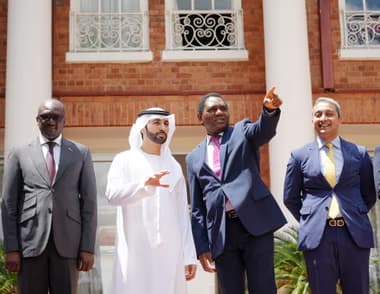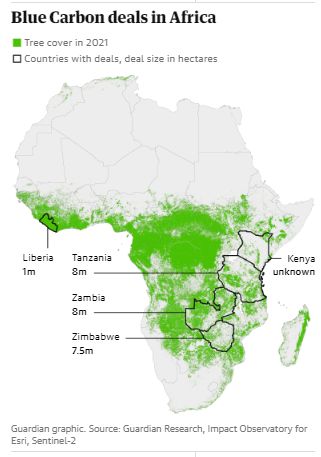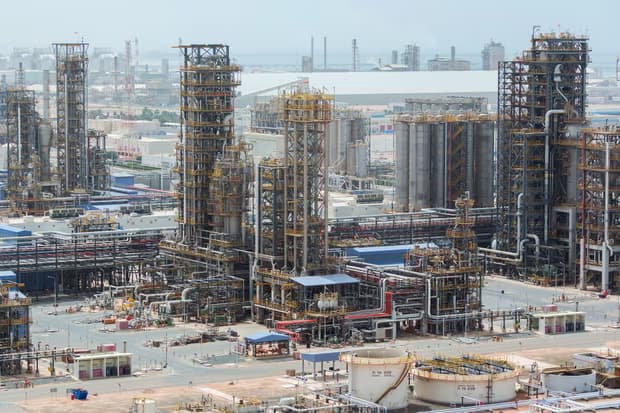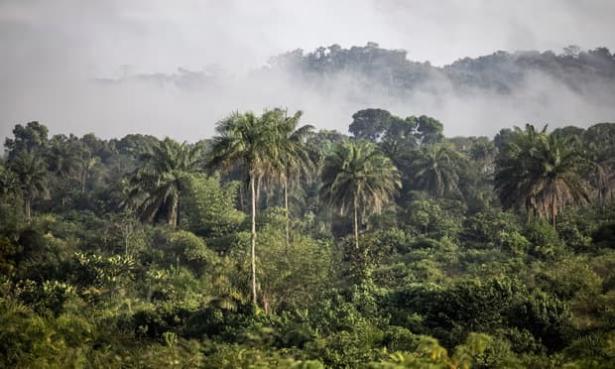The New ‘Scramble for Africa’: How a UAE Sheikh Quietly Made Carbon Deals for Forests Bigger Than UK
The rights over vast tracts of African forest are being sold off in a series of huge carbon offsetting deals that cover an area of land larger than the UK. The deals, made by a little-known member of Dubai’s ruling royal family, encompass up to 20% of the countries concerned – and have raised concerns about a new “scramble for Africa” and the continent’s carbon resources.
Such deals can deny the rights of people living on the land to make use of it for their own purposes while providing unclear benefits to the environment
As chairman of the company Blue Carbon, which is barely a year old, Sheikh Ahmed Dalmook al-Maktoum has announced several exploratory deals with African states that are home to crucial wildlife havens and biodiversity hotspots, for land that represents billions of dollars in potential offsetting revenue. The sheikh has no previous experience in nature conservation projects.
So far, the deals cover a fifth of Zimbabwe, 10% of Liberia, 10% of Zambia and 8% of Tanzania, amounting to a total area the size of the UK. In October, Blue Carbon signed its latest deal for “millions” of hectares of forest in Kenya. The company said it was also working on an agreement with Pakistan. More deals are expected in the coming months. The carbon assets associated with the deals could be bought up by major polluters and used towards their own targets under the Paris agreement.
Blue Carbon is based in the UAE, where the Cop28 summit will begin this week. The company hopes credits from the schemes will be traded as country-level contributions to the 2015 Paris agreement, it said in a statement.
However, concerns have been raised about the agreements, as well as about the sheikh’s previous business ventures, including his role in deals to sell Russia’s Sputnik V vaccine at a premium during the pandemic, and an Italian fugitive listed as a Blue Carbon advisor.
The agreements come amid widespread scrutiny of the ability of carbon markets to fund climate change mitigation effectively while protecting biodiversity and the rights of communities.
“Carbon markets are an important element of the puzzle because they can really channel resources to activities that otherwise would not be implemented,” said Axel Michaelowa, a carbon markets expert at the University of Zurich. “If the rules are interpreted in a very lenient way, we see rubbish credits being generated, then of course the trust in the market could take a big hit.”
Sheikh Ahmed declined to be interviewed for this article through his office. Blue Carbon said its “vision with these projects is not only to accelerate global climate action but also to tackle crucial environmental challenges at the local level thereby ushering in community benefits and advancing sustainable development in the countries involved”.
‘Huge swathes of land are being seized’
While little detail about the Blue Carbon deals has been made public, the Guardian has spoken with people involved and has viewed details of one draft contract from Liberia in July. The deal would give the UAE firm the exclusive rights to sell the credits for 30 years, taking 70% of the sale of the credits. Under the rules of the Paris agreement, countries that sold the credits would not be able to use them for their own commitments.

Sheikh Ahmed Dalmook al-Maktoum meets the president of Zambia, Hakainde Hichilema.
Some of those involved in these deals highlighted that carbon markets provide much-needed financial support to African countries where other sources of climate finance were not delivering. However, others raised concerns, saying the size of the land deals amount to “a new scramble for Africa”.
“Huge swathes of land across Africa are being seized by Blue Carbon via multiple, decades-long deals, sealing the fate of the very land that millions of vulnerable communities depend upon for their livelihood,” said Alexandra Benjamin, a forest governance campaigner with the NGO Fern, who focuses on Liberia and Ghana. “At Cop28, countries will meet and discuss the rules for carbon offsetting – these negotiators should call these deals for what they are: land grabs. Forest communities must have free prior and informed consent before any deal is signed,” she said.

Many African leaders are enthusiastic supports of carbon markets to fund climate change mitigation following broken promises on other sources of finance. Kenyan president William Ruto who said the continent’s carbon resources are an “unparalleled economic goldmine”.
Blue Carbon said the carbon projects would benefit communities and would operate in markets with stringent auditing. They said free, prior and informed consent was key to their project development strategy, underscoring the difference between the voluntary carbon market – where human rights issues have been a serious concern – and compliance markets.
In Liberia, NGOs have raised questions about the implication of the potential agreement for communities’ land rights and people’s access to the forest, which is often essential to their livelihoods.
David Obura, founding director of Cordio east Africa and head of the Intergovernmental Science-Policy Platform on Biodiversity and Ecosystem Services (IPBES), said: “Carbon is one of the only contributions from nature to people that is easily monetised. So, it means that all those that are not monetised get excluded or forgotten about. There are such high risks of exclusivity and obtaining access and rights away from people.”
In theory, revenue from the credits would fund climate adaptation and nature conservation in developing countries, protecting carbon sinks and biodiversity. The Blue Carbon projects would be among the largest of their kind, but governments are yet to sign off their inclusion in formal carbon trading under article 6 of the Paris agreement.
The carbon trading system could see large polluting countries such as the UK, Saudi Arabia or China buy emission removals or reductions from countries in the developing world to meet their own targets through offsets. The UAE has sought to pitch itself as a leading purchaser of African carbon credits, pledging to buy $450m (£356m) of African credits by 2030 at the Africa Climate Summit in September.

The Ruwais refinery and petrochemical complex in Al Ruwais, United Arab Emirates. Photograph: Bloomberg/Getty Images
The United Arab Emirates has the third biggest plans for oil and gas expansion in the world, analysis revealed this year. Its plans are surpassed only by Saudi Arabia and Qatar.
Blue Carbon has signed a deal with First Abu Dhabi Bank, the UAE’s largest, to finance the forest carbon project investments in September. The UN Development Programme confirmed it is in contact with the firm about how to develop the schemes.
Blue Carbon said it was committed to stringent rules about suitable methodologies for the carbon projects and would follow whatever governments agreed at Cop28. It said its team had previous experience developing carbon projects.
Additional reporting by Angela Giuffrida and Pjotr Sauer
Find more age of extinction coverage here, and follow biodiversity reporters Phoebe Weston and Patrick Greenfield on X, formerly known as Twitter, for all the latest news and features.
Patrick Greenfield is a biodiversity and environment reporter for the Guardian and the Observer. Twitter @pgreenfielduk
Make a year-end gift to The Guardian. We rely on funding from our readers, not shareholders or a billionaire owner. Join the more than 250,0000 readers in the U.S. whose regular support helps to sustain our journalism.


Spread the word